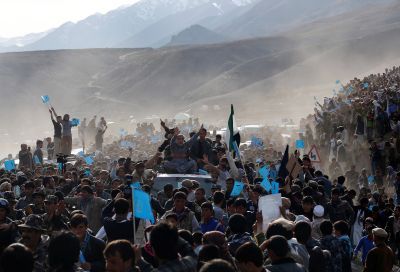 | « Back to article | Print this article |
 The people of Afghanistan prepare to choose their new president in the run-off on June14. In the first round Abdullah Abdullah, a former foreign minister led over a former finance minister Ashraf Ghani by 13 points.
The people of Afghanistan prepare to choose their new president in the run-off on June14. In the first round Abdullah Abdullah, a former foreign minister led over a former finance minister Ashraf Ghani by 13 points.
The new President will have to combat a variety of complex situations and the most important would be the declining support from the United States, a country which has supported the cause of the Afghans for over 14 years now.
If Ashraf Ghani wins the election, given the shrewd economist he is, the current phase of development would continue, with an increased focus on economic consolidation. The Taliban would continue to keep the Afghan government bleeding by inflicting damage every now and then. And the status quo would continue in Afghanistan for an extended period of time. In all likelihood, the peace process may gain momentum. Albeit remote, it is possible that some of the moderate Taliban leaders may give up their arms and abide by terms of the peace process.
However, if Abdullah emerges victorious, Afghanistan would enter into a decisive phase. Even though their policies would resonate with the ongoing peace process, they would deal with the Taliban with an iron hand, as and when they cross the red line.
The elevation of Abdullah may derail the ongoing peace process as the Taliban may not be excited with the prospect of pursuing it anymore. “The Northern Alliance, which Abdullah is a part, would further be seriously uncomfortable with the idea of sharing power with the Taliban in order to politically accommodate them under any peace deal.” said Sujeet Sarkar, who lived and worked for the Aga Khan Foundation.
Although both presidential candidates have vowed to support and sign a bilateral security agreement with the US to maintain a residual force level in Afghanistan, US forces will continue to draw-down personnel. American aid budgets will surely decrease in the coming years. The Taliban will likely view this transitional period as an opportunity to intensify its assault on new government.
The new Afghan government must take more responsibility for its financing, internal affairs and security, and international relations. The Hamid Karzai government has squandered enormous amounts of goodwill in the United States, bringing to an all-time low Afghanistan's relations with its largest provider of civilian and military assistance.
A legitimately elected successor will have the opportunity to reset the relationship, beginning by signing a bilateral security agreement, which the White House has made a necessary condition for a post-2014 U.S. troop presence. The BSA, which all the leading candidates have promised to sign if elected, will not only ensure training and support for the ANSF, but also more robust civilian assistance. Afghanistan's security situation is likely to deteriorate if US and other foreign forces withdraw [in the aftermath of the presidential elections.
Two goals seem to be driving Karzai as he obstructs a long-term US footprint in Afghanistan. Karzai is trying to ensure that after he leaves office he will continue to hold clout with successive administrations in Kabul as well as insurgent leaders, and that future generations of Afghans will remember him as a fearless nationalist who had the temerity to face down the much more powerful United States.
The outcome of the election is bound to drive the embattled nation into a decisive phase. One can only hope that it delivers the best result in the interest of Afghanistan and its people.
Abdullah recently noted corruption is a serious threat to the “stability of the country” and has vowed to clean up public corruption if elected. To do so will be a mountainous climb given the lengthy rap sheet of corruption between Afghan government officials and the nefarious business deals executed with close associates of the outgoing president -- such as the infamous Kabul Bank fiasco in which nearly $900 million (92% of the bank’s portfolio or 5% of the country’s entire economic output) was siphoned off to just 19 individuals with close ties to Karzai.
The subsequent bailout cost the US taxpayers over $800 million, a scenario that will not repeat itself. The expectation by some in Afghanistan that this type of government conduct will continue will be difficult to break. The new president will be under tremendous pressure to cut the same kind of corrupt bargains.
The cycle must be broken if Afghanistan is going to have any chance at progress. After more than a decade of intervention, the nation must believe that some modicum of progress is possible. The new president will not only have to stop this pilfering from happening, but also prove to the Afghan people that they can trust his government to act in their interest.
If Afghanistan is going to make any gains through democratic reforms, the newly elected president must start with addressing corruption at all levels of government and developing a comprehensive government financing plan independent of American support.
The Taliban will likely view this transitional period as an opportunity to intensify its assault on new government and secure control over areas throughout the country, potentially including Kabul. Signs of an emboldened Taliban have been seen in the recent Karachi airport attack and the Serena Kabul Hotel attack and they have vowed to increase the violence during and following Saturday’s vote. They also view the recent release of five Taliban leaders from Guantanamo Bay as a major victory for the insurgency and at least one of the released terrorists has promised to return to the battlefield.
Image: Presidential candidate Abdullah Abdullah arrives for a rally in Panjshir. Ahmed Masood/Reuters